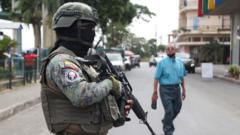Trump’s action has ignited debate over crime statistics and the effectiveness of federal control in Washington, D.C.
Trump Takes Charge: Deploys National Guard to Tackle Crime in DC

Trump Takes Charge: Deploys National Guard to Tackle Crime in DC
President declares public safety emergency amid rising tensions over crime and homelessness.
In a bold political move, President Donald Trump has announced the deployment of the National Guard to Washington, D.C., citing a need to address what he describes as rampant crime and homelessness. On Monday, Trump declared a "public safety emergency" and deployed 800 National Guard troops to supplement existing federal law enforcement, claiming the city's situation has devolved into “complete and total lawlessness.”
During a press conference, flanked by U.S. Attorney General Pam Bondi, who will oversee the police force during this federal intervention, Trump said, “This is liberation day in DC, and we're going to take our capital back.” The president's accusations of a crime epidemic stood in stark contrast to the data presented by local authorities. While there was indeed a crime spike in 2023 that mirrored national trends, statistics from the Metropolitan Police Department showed that homicides have decreased by a significant 32% between 2023 and 2024, hitting a 30-year low.
D.C. Mayor Muriel Bowser quickly contested Trump's narrative, asserting that the city is not experiencing a crime wave. "The president is very aware of our ongoing efforts," she said, pointing to the strategies employed to manage crime and homelessness. She also rebuked comparisons made by White House Deputy Chief of Staff Stephen Miller, who likened the violence in Washington to that of Baghdad, calling such statements “hyperbolic and false.”
Under the provisions of the District of Columbia Home Rule Act, Trump's action allows him to take control of the police department during an emergency, but this can only last for 30 days unless further justified to Congress. When asked about the necessity of the National Guard, Bowser expressed concern, hinting that there were already adequate measures in place to handle local law enforcement needs.
Alongside crime control, Trump voiced intentions to address homelessness, claiming to "get rid of the slums" without disclosing concrete plans. Local advocates have criticized this approach, suggesting that merely relocating the homeless won’t solve the systemic issues at play. Ralph Boyd, president of a local social services organization, argued that the focus should be on sustainable solutions rather than simply transferring the problem elsewhere.
Protests erupted around the White House as demonstrators voiced their opposition to Trump's plans, chanting calls for Washington, D.C. to maintain local governance. Critics have pointed to Trump's motives as a power grab rather than genuine concern for public safety.
This deployment of National Guard marks a significant moment, especially considering its last usage in 2021 during the Capitol riot. As tensions rise, the debate surrounding safety, governance, and the role of federal intervention in local matters continues, reflecting deep divisions in how crime and public safety are perceived and addressed in the nation’s capital.
During a press conference, flanked by U.S. Attorney General Pam Bondi, who will oversee the police force during this federal intervention, Trump said, “This is liberation day in DC, and we're going to take our capital back.” The president's accusations of a crime epidemic stood in stark contrast to the data presented by local authorities. While there was indeed a crime spike in 2023 that mirrored national trends, statistics from the Metropolitan Police Department showed that homicides have decreased by a significant 32% between 2023 and 2024, hitting a 30-year low.
D.C. Mayor Muriel Bowser quickly contested Trump's narrative, asserting that the city is not experiencing a crime wave. "The president is very aware of our ongoing efforts," she said, pointing to the strategies employed to manage crime and homelessness. She also rebuked comparisons made by White House Deputy Chief of Staff Stephen Miller, who likened the violence in Washington to that of Baghdad, calling such statements “hyperbolic and false.”
Under the provisions of the District of Columbia Home Rule Act, Trump's action allows him to take control of the police department during an emergency, but this can only last for 30 days unless further justified to Congress. When asked about the necessity of the National Guard, Bowser expressed concern, hinting that there were already adequate measures in place to handle local law enforcement needs.
Alongside crime control, Trump voiced intentions to address homelessness, claiming to "get rid of the slums" without disclosing concrete plans. Local advocates have criticized this approach, suggesting that merely relocating the homeless won’t solve the systemic issues at play. Ralph Boyd, president of a local social services organization, argued that the focus should be on sustainable solutions rather than simply transferring the problem elsewhere.
Protests erupted around the White House as demonstrators voiced their opposition to Trump's plans, chanting calls for Washington, D.C. to maintain local governance. Critics have pointed to Trump's motives as a power grab rather than genuine concern for public safety.
This deployment of National Guard marks a significant moment, especially considering its last usage in 2021 during the Capitol riot. As tensions rise, the debate surrounding safety, governance, and the role of federal intervention in local matters continues, reflecting deep divisions in how crime and public safety are perceived and addressed in the nation’s capital.



















